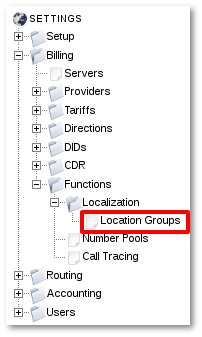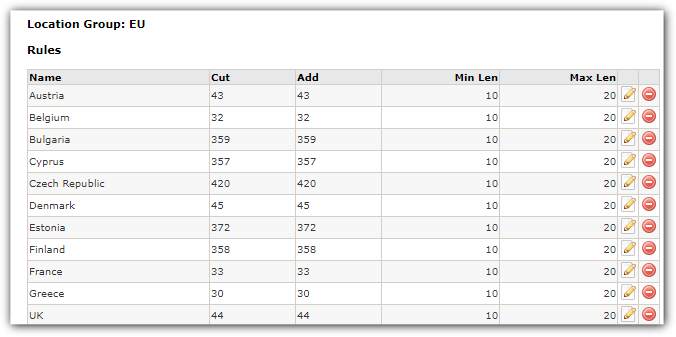Difference between revisions of "Location Groups"
| (13 intermediate revisions by 3 users not shown) | |||
| Line 1: | Line 1: | ||
= Description = | = Description = | ||
Used with [[Localization#Rules | Source Combined Rules]]. | Used with [[Localization#Rules | Source Combined Rules]]. Helps reduce the amount of rules. | ||
== Configuration == | == Configuration == | ||
| Line 9: | Line 9: | ||
[[Image:Location_groups_menu.png]] | [[Image:Location_groups_menu.png]] | ||
<br><br> | <br><br> | ||
Create groups | Create groups: | ||
<br><br> | <br><br> | ||
[[Image:Location_groups.png]] | [[Image:Location_groups.png]] | ||
<br><br> | <br><br> | ||
Create rules | Create rules: | ||
<br><br> | <br><br> | ||
[[Image:Location_groups_rules.png]] | [[Image:Location_groups_rules.png]] | ||
<br><br> | <br><br> | ||
== Assign Location Group == | |||
Choose your Location Group in [[Localization#Rules | Source Combined Rules]]: | |||
<br><br> | |||
[[Image:Location_groups_combined.png]] | |||
<br><br> | |||
= Origin Based Rating (OBR) | Call Charging on Location Base = | |||
Origin Based Rating (OBR) is a billing mechanism that takes into account both the origination (where the call begins) and termination (where the call ends)of a call when calculating billing. | |||
In OBR, the cost of terminating a call is influenced by the country or region from which the call originated. This means that the terminating provider, often a mobile operator, applies additional fees or surcharges to the standard termination rates based on the country code or geographic location of the caller. | |||
Essentially, OBR involves charging different rates for terminating calls based on the originating country, allowing telecom providers to adjust their fees depending on where the call is coming from. This method can result in varied costs for calls depending on their point of origin, allowing for a more nuanced billing structure in the telecommunications industry. | |||
Origin Based Rating (OBR) is supported by MOR and here we will cover the following cases: | |||
# Call from EU to EU (Greece as an example) | |||
# Call from non-EU to EU (Greece as an example) | |||
# Call from non-EU to non-EU country | |||
In #1 and #2 Greek number belongs to provider A with NRN 589000 and Greek destination number is in format 302XXXXXXXXX, which is made by [[Prelocalization]]. | |||
Later MNP adds Provider NRN 589000 to the 302XXXXXXXXX and call with Destination 589000302XXXXXXXXX comes to MOR Core Localization for further analysis. And here we will take care of it. | |||
<br><br> | |||
== Case #1 - Call from EU to EU (Greece as an example) == | |||
[[File:location_groups2.png]] | |||
With this rule we determine that call with Destination which starts with 589000302 and CallerID from EU should be routed to LCR10 and Tariff10 should be used. Only one rule covers whole Europe's CallerID's which are described in Localization Group EU. | |||
<br><br> | |||
== Case #2 - Call from non-EU to EU (Greece as an example) == | |||
[[File:location_groups3.png]] | |||
With this rule we determine that call with Destination which starts with 589000302 and CallerID from non-EU countries should be routed to LCR20 and Tariff200 should be used. Only one rule covers whole non-Europe's CallerID's which are described in Localization Group non-EU. | |||
<br><br> | |||
== Case #3 - Call from non-EU to non-EU country == | |||
Here no special rule is necessary. Simple Destination rule can be used if Tariff and/or LCR should be changed. | |||
<br><br> | |||
=See also= | |||
* [[Localization]] | |||
* [[Prelocalization]] | |||
Latest revision as of 06:07, 1 December 2023
Description
Used with Source Combined Rules. Helps reduce the amount of rules.
Configuration
Click on Location Groups.

Create groups:

Create rules:

Assign Location Group
Choose your Location Group in Source Combined Rules:

Origin Based Rating (OBR) | Call Charging on Location Base
Origin Based Rating (OBR) is a billing mechanism that takes into account both the origination (where the call begins) and termination (where the call ends)of a call when calculating billing.
In OBR, the cost of terminating a call is influenced by the country or region from which the call originated. This means that the terminating provider, often a mobile operator, applies additional fees or surcharges to the standard termination rates based on the country code or geographic location of the caller.
Essentially, OBR involves charging different rates for terminating calls based on the originating country, allowing telecom providers to adjust their fees depending on where the call is coming from. This method can result in varied costs for calls depending on their point of origin, allowing for a more nuanced billing structure in the telecommunications industry.
Origin Based Rating (OBR) is supported by MOR and here we will cover the following cases:
- Call from EU to EU (Greece as an example)
- Call from non-EU to EU (Greece as an example)
- Call from non-EU to non-EU country
In #1 and #2 Greek number belongs to provider A with NRN 589000 and Greek destination number is in format 302XXXXXXXXX, which is made by Prelocalization.
Later MNP adds Provider NRN 589000 to the 302XXXXXXXXX and call with Destination 589000302XXXXXXXXX comes to MOR Core Localization for further analysis. And here we will take care of it.
Case #1 - Call from EU to EU (Greece as an example)
With this rule we determine that call with Destination which starts with 589000302 and CallerID from EU should be routed to LCR10 and Tariff10 should be used. Only one rule covers whole Europe's CallerID's which are described in Localization Group EU.
Case #2 - Call from non-EU to EU (Greece as an example)
With this rule we determine that call with Destination which starts with 589000302 and CallerID from non-EU countries should be routed to LCR20 and Tariff200 should be used. Only one rule covers whole non-Europe's CallerID's which are described in Localization Group non-EU.
Case #3 - Call from non-EU to non-EU country
Here no special rule is necessary. Simple Destination rule can be used if Tariff and/or LCR should be changed.


